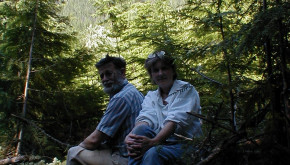
I want to discuss our ongoing family conversation about creating a conservation easement with a land trust. In other words, we have not yet made a decision. We've wrestled long and hard with making the decision. I think of these conversations as rather like the Mosquito Creek that runs through our forestland in northern Idaho.
Mosquito Creek goes dry every summer, but really the creek is underground. (We used to take bets on dates the creek would stop running.) The creek's path winds through moss and cedars, and I love to walk the dry bed to see how far north I can push until the water starts running again. Further up, the creek is surrounded by devil's club, a shrubby mean plant with spiky thorns on its stems. The creek is full of differently sized rocks, slip off one and grab the devil's club, and yell, "ouch" or something worse! The other colloquial name, devil's walking stick, is fitting, because you walk away feeling like you've got a stick in your palm, though it's only an intractable sliver.
My mother passed away several years ago, and she was dedicated to stewarding our forestland. I've written about my mom's passing and our efforts at legacy planning here. As part of her legacy, Mom wanted a conservation easement installed on our land.
According to Inland NW Land Trust, "A conservation easement is a voluntary agreement between a landowner and a qualified conservation organization that restricts particular development uses of the landowner’s property in order to protect certain resources and traditional uses."
But here's the rub. My mom passed away before we established a conservation easement, and my dad and I were left wrestling with the decision. We're committed to honoring my mom's wishes, particularly because our forestland connects us to her, but we also have concerns. My parents did not disagree about a conservation easement, but as my mother’s cancer progressed, her ability to lead the way—as she had always done—lessened.
My father continues to live on their land, and he’s equally committed to managing and stewarding it. (Though my dad dislikes the word “managing”—he prefers “stewarding.”) My father says, "if you care about preserving the land, and pushing back against development, it’s a no-brainer. On the other hand, if your own lives—or heirs—have the potential need for other options, then it is not as straightforward a decision. There are many aspects to consider. You also really need to consider what is happening around you on adjacent land."
For us, a conservation easement would specify our intentions for the forestland, and we would work in coordination with a land trust to set up the legal paperwork to enhance the protection of our land. This seems particularly important because it specifies the wishes of landowners for future generations. But it also means that future generations have to abide, legally, by such agreements. We've had a wonderful forester from a local land trust visit the land, and this person has been an enormous help. I've talked to several neighbors who have conservation easements through land trusts, and all have had fantastic experiences.
For us the decision seemed like a no-brainer, but when we started analyzing all the aspects—what we call all the “what-ifs”—we knew we needed more time to make a decision. Once we took that time, we got all tangled in those possibilities. It was incredibly difficult to sort through emotions, thoughts, facts, and possibilities.
It’s important to think very carefully about a land trust. The following are just a few of the questions with which my father and I have wrestled. With whom will you enter into the agreement? Will the organization you want, approve your land for entry in their program? How much will it cost you? Are there granting organizations to help you with the cost of a timber survey, a lawyer’s review, and the basic agreement with the land trust? Most land trusts will require a fee. They have to cover their costs, too. You’ll also possibly be eligible for financial and tax benefits, which can be important to consider as part of the financial end of the decision. Will a land trust agreement change the resale value of your property? You will still own your land, as the easement only conveys certain rights. The easement, though, helps protect and preserve rural heritage. Another consideration: a land trust agreement might better help you find the kind of people you want to sell your land to should you need to sell. Furthermore, what are the borders surrounding you? Are those lands in a trust? Do they have an easement? Are they private, corporate, state, or federal lands?
Rather like our creek that runs dry every summer, our conservation easement conversation has run dry these days. The decision is there--yet to be made. Our land is bordered by USFS land and a corporate landowner on the others. Now the corporation is selling a few tracts, so we need to revive our discussion.
In these pages, Amanda Subjin has written eloquently about using a land trust; she writes: "Deciding to protect your cherished piece of land is only the beginning of a lifelong relationship." You can read Subjin's article here. Another helpful article on "Protecting Land to Leave a Legacy" by Shary Skoloff can be found here.

